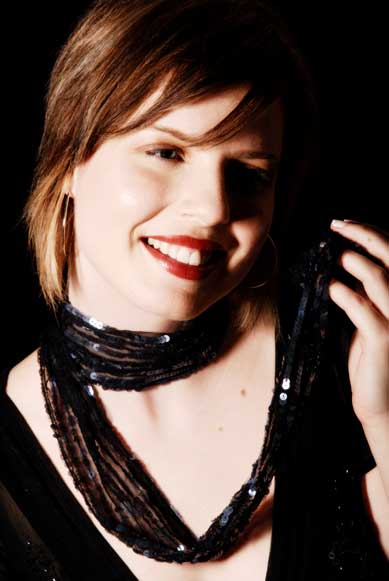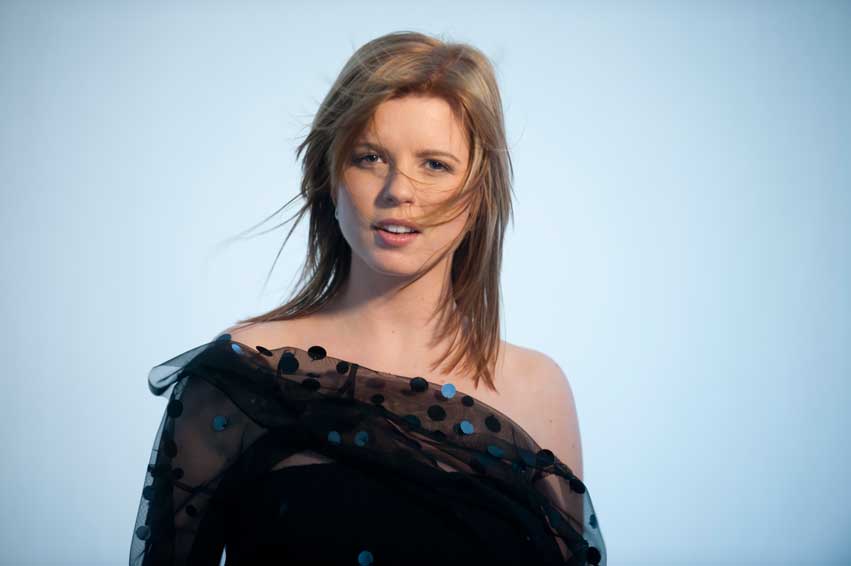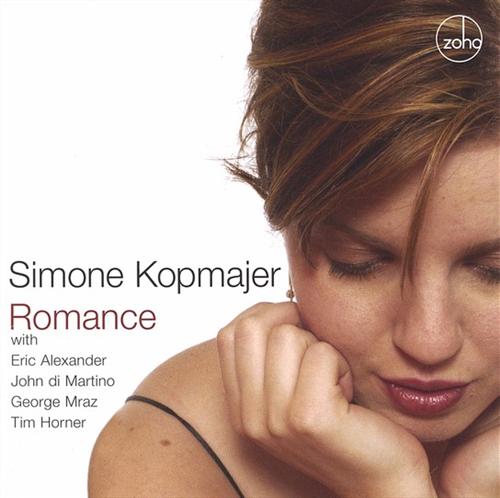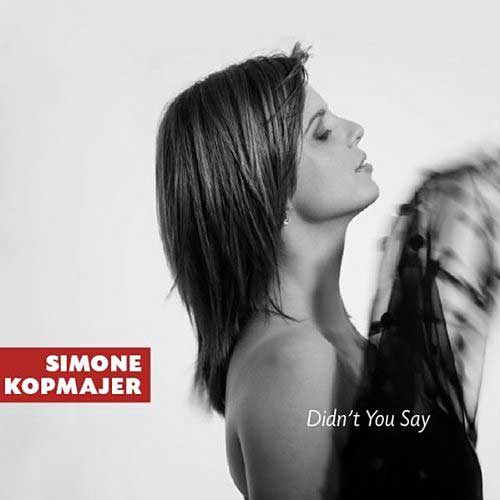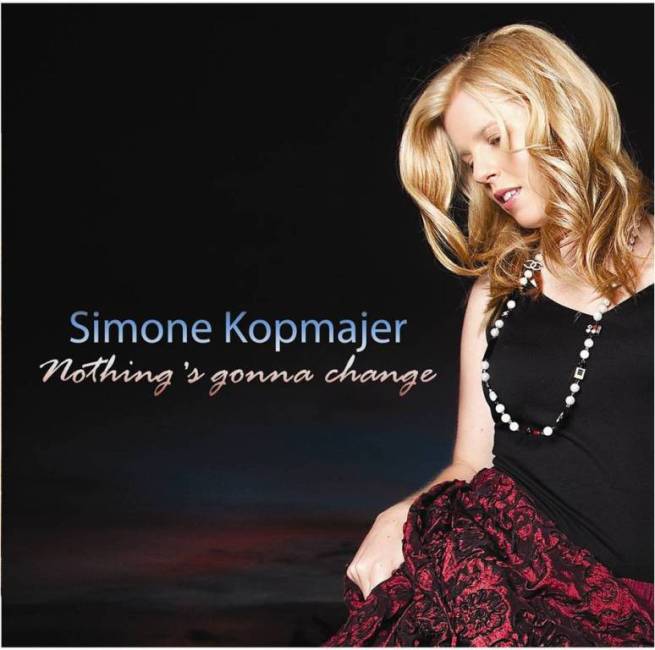Austria
Elegant Pop-Jazz In The Classic American Style
Using the Great American Songbook as her guide, Vienna’s Simone Kopmajer is carving out her own niche on the international pop-jazz scene
Simone Kopmajer: ‘I'm from a small village in Austria and all my dreams have already come true! So the only thing I can think of is that I would like to sing as long as possible and create music that touches people.’ (Photo:Mary Jane Photography.net)Austria. Its most famous city, Vienna, was home to Mozart and is home to the country’s greatest traditional folk artist, Roland Neuwirth (profiled in our April issue). As it turns out, Rodgers and Hammerstein were right: the hills too are alive with music, as evidenced by the growing reputation of a talented young Austrian artist who is making a name for herself not merely singing pop music, but specifically singing pop music associated with, oh, Frank Sinatra, and the Great American Songbook. That is exactly what Simone Kopmajer (pronounced "Cop-meyer") has done, though, and in impeccable, unaccented English, with a wonderful sense of rhythm, phrasing and vocal dynamics. A big draw overseas and in Japan, Ms. Kopmajer, who emerged from a small village in those apparently musical Austrian hills, has caught the attention of American musicians and critics, but to date only her 2005 Romance album has been released in the U.S.
Ms. Kopmajer grew up in a family of musicians She started classical piano lessons at age eight and at 12 began playing saxophone. She performed in a youth big band and sang regularly in her father's band as a teenager. Early on she entered and won various talent contests and even made appearances on television in Austria. As a young performer, she twice toured the Netherlands with the Euro Big Band and later appeared at several International Jazz Festivals.
Simone Kopmajer, ‘Nothing’s Gonna Change My Love For You’Influenced by some of the great American vocalists--Frank Sinatra, Ella Fitzgerald and Jon Hendricks, principally--Simone has developed into a true jazz singer, one who employs a wide variety of rhythms and excels in her very individual style of scatting. Renowned jazz interpreter Laurie Antonioli says that "Simone is an excellent musician, with soulful and hip improvising. She digs in and isn't afraid to take risks with the music." Simone received her Masters Degree from the University for Music and Dramatic Arts in Graz, Austria where she had the opportunity to work with such jazz luminaries as Sheila Jordan, Michele Hendricks, and the New York Voices, and over the years she has performed with greats such as Ira Sullivan, George Mraz, Christian McBride, Larry Coryell, and many others.
Acclaim for her 2005 debut CD, Romance, was immediate upon its release here. A sampling of the observations about the disc:
From William Grim, in All About Jazz.com, March 17, 2005:
Romance is the debut CD by Austrian singing wunderkind and Mark Murphy protege Simone Kopmajer, who sings with a maturity that belies her age of 23. Two things that immediately struck this listener were Kopmajer's good taste and her acute ear. By acute ear, I mean her sensitivity to what is going on around her musically, for Simone Kopmajer is not just a singer, she is a musician who just happens to sing.
Simone Kopmajer, the official EPK for her Didn’t You Say albumShe starts off her album with "How Do You Keep the Music Playing?," a song that in most incarnations is presented as sheer schlock. But Kopmajer keeps things understated and never gets ahead of the rhythm section. This is a singer who understands that the best way to swing is to lay back of the beat a little. This rhythmic patience is seen in all of her performances on the album and is illustrative of a very gifted and mature musician. She has definitely taken to heart the lessons taught by her mentor, Mark Murphy.
Pianist's John di Martino's arrangements are ideally suited to Kopmajer's vocal talents. I especially like his arrangement of "Exactly Like You," which features a bass line taken from Miles Davis' "All Blue." Of course, it only makes sense to feature the bass prominently when you have at hand the services of the incomparable George Mraz. Di Martino's scoring expertise is likewise featured in "The Way You Look Tonight," which gets a Latin makeover with an impressionistic chordal intro.
Simone Kopmajer, the title tune from her Didn’t You Say albumKopmajer also knows her way very well around Brazilian music. She gives an excellent interpretation to Jobim's "Someone to Light Up My Life" ("Se Todos Fossem Iguais a Voce") and the bossa nova arrangement of "A Blossom Fell." And given her flawless and unaccented English, it wouldn't be too surprising if someday she does the same with the original Portuguese lyrics.
Simone Kopmajer is a first-rate talent and a gifted musician, and her singing is a real joy to behold. Judging from this album, we're going to be hearing a lot from her in the future.
Simone Kopmajer, ‘Come Fly With Me,’ from her Didn’t You Say albumWill Friedwald, a recognized authority on jazz and classic pop singers, penned the liner notes for Romance. His observations, in part, include:
There's a lot to be said for simplicity. You'd be surprised how hard it is to take a great song and sing it simply and meaningfully. But when it's done well, it's the most rewarding thing there is. Likewise, simplicity is an essential ingredient in romance. The singer Simone Kopmajer clearly realizes that job one is to let emotion drive the whole works. The idea to begin with and keep that old horse before the cart, then romance can't help but emerge naturally from the great love songs. "The idea is not to overload it," says Ms. Kopmajer, "to keep your message simple and honest so it will go right into the heart of the listener. That's the highest goal you can achieve."
Simone's singing also testifies to the validity of an idea I've heard expressed independently by two male singers, one very experienced, Tony Bennett, and the other comparatively young, Allan Harris. Namely, that women are able to express their emotions in a more direct and honest way at a much earlier age than men, and that a 23-year-old female singer can open herself up in a way that a male performer with more experience can't. Even she notes that "One of the nice things about making a record is that you can concentrate on one particular mood. If I were in a club, the people want to hear a variety of things, but here I can sustain the romantic atmosphere for as long as I like."
Simone Kopmajer, Gershwin’s ‘S’Wonderful,’ from her Didn’t You Say albumThe most we have heard from Ms. Kopmajer herself is by way of an email interview with Jazz Review.com’s Lawrence Williams in April 2005, available online at the artist’s website. Some excerpts:
When did your interest in music begin?
My interest in music began very early because I grew up in a musical family! I started playing classical piano at the age of eight and I always sang along with my father's [records]--such songs as "Feelings," "My Way," "Volare" and "Hello Dolly."
You come from a musical family. Are they professional musicians?
My parents are both music teachers. My mother plays flute and my father plays classical trumpet. He played in a professional band for years and he was my first "vocal teacher."
Are the other members of your family musical as well?
I have one brother, his name is Philip and he is 20 years old. He's played the drums since he was four and we've always played together. Philipp was the drummer on my first record, Moonlight Serenade (Venus Records).
Do you remember the first song you ever sang?
I was about 10-years-old when I was invited to sing two tunes with my father's band at a garden party. My brother played drums and I sang "Beir Mir Bist Du Schon" and "Quando, Quando."
Simone Kopmajer, ‘Forgetting to Breathe,’ from her Didn’t You Say albumWhen did your interest in jazz begin?
I would say at the age of 12 when I started playing piano in a teenaged big band.
At what age did you start singing professionally?
At the age of 15.
Have you ever wanted to sing other types of music besides jazz?
At the age of twelve I mostly listened to Aretha Franklin, Mariah Carey and Whitney Houston. But I got my first jazz album called 100% Jazz with Nina Simone, Ella and Louis, Glenn Miller, Stan Getz...and I loved it!
Do you still listen to other kinds of music besides jazz? If so, who are your favorite artists outside the jazz world?
My favorite artists outside of the jazz world are Stevie Wonder, Aretha Franklin, Prince and Eva Cassidy.
What is it about jazz that makes you want to sing it as opposed to other types of music?
You can sing a jazz standard without knowing the original version. You sing it the way you feel it and in the end it [becomes] your song. I think [with jazz] you have more freedom than other kinds of music where everybody would say, "That doesn't sound like the original version." I love jazz because you can improvise!
What does singing jazz mean to you? How does it make you feel?
It's music where you can take a lot of risk. Together with the band you create music that is always different.
What is the hardest part about singing jazz?
I think the hardest part is the phrasing; you have it or you don’t!
‘You can sing a jazz standard without knowing the original version. You sing it the way you feel it and in the end it becomes your song.’What singers and/or instrumentalists have influenced your style the most?
Ella Fitzgerald, Frank Sinatra, Louis Armstrong. But also the younger musicians like Kurt Elling, Diana Krall and Kevin Mahogany.
What impact did Mark Murphy and Sheila Jordan have on the way you sing and perform today?
Sheila Jordan and Mark Murphy were very important for me: Ms. Jordan, for example, always believed in me and gave me the opportunity to study at the workshop “Jazz in July" in Amherst, Massachusetts. Mark Murphy taught me how to choose the right tune, arrange songs and how to work with a band.
Let’s talk about your new album, Romance. How did it come about?
Heidi Deleuil, who owns Heidi's Jazz Club in Coco Beach, Florida, gave my demo CD to Mark Murphy, who hadn't heard me sing for a few years. He sent it to Todd Barkan, who then invited me to a studio session at Avatar Studio in New York City.
You sing a variety of songs on Romance, from classic tunes such as "A Blossom Fell" to more contemporary songs, like "Calling You" (The theme song to the 1990 film, Bagdad Cafe) and Bill Withers' "Whatever Happens." How did you choose the songs for this album?
I chose the tunes together with producer Todd Barkan. It's funny because I picked older songs such as "A Blossom Fell" and "Just Squeeze Me" and he introduced me to "Calling You" and "Whatever Happens."
Simone Kopmajer, ‘The Sun Down’Is there a song on the album that is a personal favorite? Why?
My personal favorite is "How Do You Keep The Music Playing," because for me it's one of the most beautiful ballads I've heard so far.
What makes you want to sing a particular song?
First of all I listen to the melody--if it touches me I check out the lyrics--then I take it.
Do you find there is a difference between American and European Audiences? If so, what?
The American audience is much more enthusiastic than the European audience and they often know the lyrics to the standards--they can sing along with you. That's cool!
What do you hope to achieve in your career?
I'm from a small village in Austria and all my dreams have already come true! So the only thing I can think of is that I would like to sing as long as possible and create music that touches people.
What makes you the happiest?
That I have a family that loves and supports me!!!
***
Simone Kopmajer DISCOGRAPHY (as listed at the artist’s WEB-Shop)
Moonlight Serenade (2004--Japan Edition)
Romance (2004--Japan Edition)
Romance (2005--USA Edition)
Taking a Chance On Love (2007--Japan edition)
New Romance (2009)
Let’s Fall In Love (2008--Japan Edition)
Essential Best (2009--Japan Edition)
Didn’t You Say (2010--European Edition)
Nothing’s Gonna Change (2011)
Founder/Publisher/Editor: David McGee
Contributing Editors: Billy Altman, Laura Fissinger, Christopher Hill, Derk Richardson
Logo Design: John Mendelsohn (www.johnmendelsohn.com)
Website Design: Kieran McGee (www.kieranmcgee.com)
Staff Photographers: Audrey Harrod (Louisville, KY; www.flickr.com/audreyharrod), Alicia Zappier (New York)
E-mail: thebluegrassspecial@gmail.com
Mailing Address: David McGee, 201 W. 85 St.—5B, New York, NY 10024



